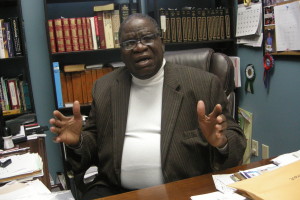
The Good word: THE PURPOSE OF LIFE
By Bishop Jacob Afolabi
Whether we believe in God or not, everyone on this earth has two ministries. The first one is, serving God by ministering to Him in recognition of His sovereignty and ownership over all things, “And ye shall serve the LORD your God” (Ex.23:25). The second is ruling over all Creation, those within our immediate reach and aspiring to touch even those that are far away. This may be considered our duty to minister to every nature on earth. And God said, Let us make man in our image, after our likeness: and let them have dominion…over all the earth” (Gen.1:26).
Adam and Eve had the same two-fold duties; to minister to nature by cultivating the Garden and have dominion over all creation, as well as to minister to God in the fellowship of obedience to His word. The test that they failed in the Garden of Eden was to determine which of these two ministries they considered as being more important. In Genesis 2:16,17 it reads, “God commanded the man, “You are free to eat from any tree in the garden; but you must not eat from the tree of the knowledge of good and evil.” This one provision was for the purpose of ministering to God – in obedience
Worries about this life’s provisions make us to lose the real purpose of life. Joseph said in Gen.39:9, “How then could I do such a wicked thing and sin against God?” Even though Joseph was busy ministering to the household needs of his master, he did not forget to minister also to God by rejecting every appearance of evil. The provision of an illicit enticement to perform an illegitimate pleasure was strongly refused by Joseph. This rejection led to his suffering, but it also sealed his fate, the perfection of the purpose of his life.
Moses too preferred to suffer afflictions with his people than to continue to wine and dine in the Egyptian majestic mansions. “By faith Moses, when he had grown up, refused to be known as the son of Pharaoh’s daughter. He chose to be mistreated along with the people of God rather than to enjoy the pleasures of sin for a short time. He regarded disgrace for the sake of Christ as of greater value than the treasures of Egypt, because he was looking ahead to his reward.” (Heb.11:24-26 NIV).
The transformation of the fortunes of Moses, from an adopted Prince of Egypt to a fugitive offender, marked his separation from the enjoyment of momentary pleasures into the possession of eternal treasures according to God’s purpose. That was why he had to undertake a lonely desert journey and accomplish a season of maturity in God’s moral education. Joshua said, But as for me and my household, we will serve the LORD.” (Josh.24:15). Citizenship of the Land was something small compared with the opportunity to serve the Lord in the Land of Promise.
Prophet Samuel said to King Saul; “Does the LORD delight in burnt offerings and sacrifices as much as in obeying the voice of the LORD? To obey is better than sacrifice, and to heed is better than the fat of rams. Because you have rejected the word of the LORD, he has rejected you as king.” (1Sam.15:22-23). God’s presence was far more important that the collection of the booties of war.
King David said, “Better is one day in your courts than a thousand elsewhere; I would rather be a doorkeeper in the house of my God than dwell in the tents of the wicked.” (Ps.84:10). Constant and joyful appearance before God is worth more than being anywhere else.
Paul the Apostle said, “What is more, I consider everything a loss compared to the surpassing greatness of knowing Christ Jesus my Lord, for whose sake I have lost all things. I consider them rubbish, that I may gain Christ“(Phil.3:8,9). Preference for the things of God is what separates the saints from the sinners. That is why the saints live, and the sinners die!
Jesus summed up this attitude – “Meanwhile his disciples urged him, “Rabbi, eat something.” But he said to them, “I have food to eat that you know nothing about.” Then his disciples said to each other, “Could someone have brought him food?” “My food,” said Jesus, “is to do the will of him who sent me and to finish his work.”(John 4:31-34). He ministered first to the business of the Kingdom of God before He ministered to His own nature.
Let us who will enjoy the eternal Kingdom of God ensure that our ministry to the Kingdom takes precedence over our ministry to nature. “He has showed you, O man, what is good. And what does the LORD require of you? To act justly and to love mercy and to walk humbly with your God.” (Micah 6:8).
Bishop Jacob Afolabi
